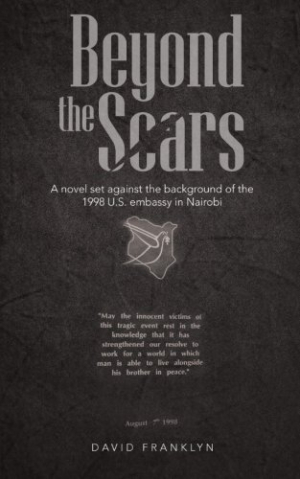Beyond the Scars
A Novel Set Against the Background of the 1998 U.S. Embassy in Nairobi
Anguish sears the pages of this novel, and the author’s experience in Nairobi brings terrorism’s aftermath to life.
How does a person cope after experiencing immeasurable tragedy—the world shaking from a bomb blast and the loss of those held most dear? In his novel Beyond the Scars, David Franklyn shows how difficult moving forward can be and how surviving such a trauma makes living harder.
In 1998, Osama Bin Laden bombed the U.S. embassy in Nairobi, killing hundreds of innocent people. Juma and his wife, Poetry, live through the blast, but many of the people they know do not survive. Poetry sinks into the space between living and insanity over the loss of her best friend. As Juma tries to understand Poetry’s struggles, he has to face his own fears and feelings of guilt and sorrow. It will take all his strength to pull himself through, but it will take much more to bring Poetry back to life.
This first-person narrative digs deep into the characters’ psyches and takes a close look at the aftermath of a terrorist bombing, based on the historical event. In the author’s note, Franklyn states that he was in Nairobi when the attack occurred, and his firsthand perspective is evident in his use of vivid details. Anguish sears the pages, and Franklyn’s experience brings the aftermath to life.
Perhaps because of his experience and his hope to share the disaster with others, the novel is saturated with overly flowery description. For example, the narrator says, “words hidden under her tongue fall from her lips, finding expression on the pages of the wind.” For the most part, though, the poetic prose is emotionally engaging, even while it tends to slow the novel’s pace. Moments of tension, such as searching for a loved one after the bombing, should move quickly, but the writing style weighs down the action, resulting in slow-moving scenes. Furthermore, most of the novel consists of exposition. The minimal dialogue, though, is generally realistic and representative of the character speaking. Another cause of the slow pace occurs around the midpoint of the novel, when the point of view changes to Juma’s nephew. The switch occurs suddenly, creating confusion as to who is telling the story. This slowly becomes clear as Juma enters the scene as “Uncle Juma.”
While the details and facts he shares help bring this period in history to life, Franklyn’s firsthand experience with the bombing has made it difficult to minimize sentiment and to allow the narrators to share their tales, which could open up the writing to a much broader audience. However, the novel provides a much-needed plea for peace, which elevates the story and garners respect.
Reviewed by
Kandy Alameda
Disclosure: This article is not an endorsement, but a review. The publisher of this book provided free copies of the book and paid a small fee to have their book reviewed by a professional reviewer. Foreword Reviews and Clarion Reviews make no guarantee that the publisher will receive a positive review. Foreword Magazine, Inc. is disclosing this in accordance with the Federal Trade Commission’s 16 CFR, Part 255.

